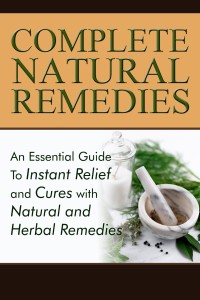 The common cold is an infection that invades your nose and throat and is caused by a commonly found virus. Most people catch between two and four colds a year, depending upon the level of their immune system and how well they’re able to take care of themselves. Symptoms will usually appear one to three days after exposure to the virus and those symptoms include a runny nose, cough, nasal congestion, sneezing, watery eyes and a mild headache. Sometimes individuals will suffer from a low grade fever on the first day of their cold but this does not mean that they have the flu. (1)
The common cold is an infection that invades your nose and throat and is caused by a commonly found virus. Most people catch between two and four colds a year, depending upon the level of their immune system and how well they’re able to take care of themselves. Symptoms will usually appear one to three days after exposure to the virus and those symptoms include a runny nose, cough, nasal congestion, sneezing, watery eyes and a mild headache. Sometimes individuals will suffer from a low grade fever on the first day of their cold but this does not mean that they have the flu. (1)
The invasion of viruses in the body which causes the symptoms can be slowed, stopped or even eliminated with a few simple steps that you can take either before you get a cold or immediately upon discovering the symptoms. The first step that needs to be taken is to allow the body enough rest. Rest will help the body to heal itself, bolster the immune system and even help you feel better. Rest is even free! If you think that you can’t take the time off to stop and just rest, imagine how many more days you will have to take off if a bad cold impacts your ability to work or go to school.
 The second step is to always get good nutrition, whether it’s cold and flu season or not. We really are what we eat and when we provide our body with an appropriate amount of vitamins and minerals we are rewarded with overall good health. Your diet should consist of a large amount of whole foods, meaning raw and unprocessed.
The second step is to always get good nutrition, whether it’s cold and flu season or not. We really are what we eat and when we provide our body with an appropriate amount of vitamins and minerals we are rewarded with overall good health. Your diet should consist of a large amount of whole foods, meaning raw and unprocessed.
When you have a cold, or even when you are trying to prevent a cold, it is important to blow your nose regularly, rather than sniffing the mucus back into your head. There is conflicting evidence for the use of normal saline to prevent and treat a cold. To prevent the cold you can try normal saline nasal spray and gently blow the spray back out. Use normal saline spray even when you have a cold to help eliminate the viral load in your nose. When you blow hard the extra pressure can cause an ear ache or blow some of the virus back into the head. (2,3)
Mom used to tell you to gargle with salt water when you had a sore throat because it could bring temporary relief. Today researchers know that gargling with salt water can also help to prevent a cold by decreasing the viruses which are multiplying at the back of your throat. If you have a sore throat you can try other gargle remedies, such as adding lemon juice and honey to water or reducing the tickle in your throat by gargling with tea that contains tannin. Never give honey to a child less than one year old. (4)
Resources:
(1) MayoClinic.com: Common Cold
http://www.mayoclinic.com/health/common-cold/ds00056/dsection=symptoms
(2) Archives of Family Medicine: A Clinical Trial of Hypertonic Saline Nasal Spray in Subjects with the Common Cold or Rhinosinusitis
http://www.ncbi.nlm.nih.gov/pubmed/9443697
(3) University of Maryland Medical Center: Sinus Headache
http://www.umm.edu/altmed/articles/sinus-headache-000073.htm
(4) American Association of Retired Person: Mom Was Right- Gargling Helps
http://www.aarp.org/health/conditions-treatments/info-10-2010/gargling_does_help.html
(5) MayoClinic.com: I’ve heard that you shouldn’t drink milk when you have a cold because it increases phlegm. Is this true?
http://www.mayoclinic.com/health/phlegm/AN01455
(6) University of Helsinki: Zinc Lozenges May Shorten Common Cold Duration
http://www.sciencedaily.com/releases/2011/07/110726092948.htm
(7) Medical Hypotheses: Zinc Lozenges as Cure for the Common Cold – A Review and Hypothesis
http://www.ncbi.nlm.nih.gov/pubmed/19906491
| Advertisement | |
 |
|


Leave a Reply